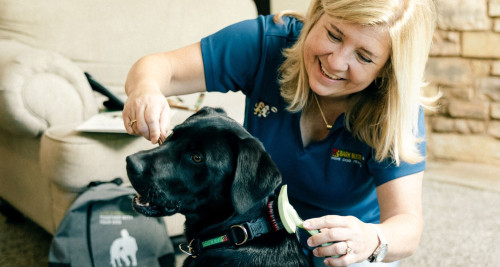Tips & Advice
Dog Training Tips & Advice. Read our latest news!
Looking for more resources? Check out our free downloadable dog training guides.

Holiday Dog Safety Guide: What Every Pet Owner Should Know
December 4, 2025
The holiday season is a joyful time to gather with family and friends, decorate around the home, and enjoy traditions old and new. Keep your dog safe and happy with our tips for a fun, stress-free season.

12 Best Gifts for Dog Lovers: Bark Busters 2025 Holiday Gift Guide
November 28, 2025
Bark Busters’ 2025 Dog Lovers Gift Guide: 12 top picks for dogs and pet parents, from practical essentials to fun favorites. Perfect holiday gifts!

Thanksgiving Safety Tips for Your Dog
November 1, 2025
Thanksgiving is a holiday that all family members can enjoy – including your dog. Follow these tips to make sure everyone can indulge and celebrate safely.

How to Keep Your Dog Safe on Halloween
October 10, 2025
Keep your dog safe this Halloween with tips on avoiding candy, costumes, decorations, and stress from trick-or-treaters and loud noises.

How to Potty Train A Puppy (Fast, Kind, and Consistent)
October 3, 2025
Establishing a toilet training routine with puppies (usually at around three months old) requires time, effort, and consistency to yield results, but the benefits are well worth it.

Dog Handling Training: How to Build Comfort with Handling at Home
September 25, 2025
Every dog benefits from gentle, positive handling at home. Regular practice reduces stress and anxiety, helping your dog stay calm and cooperative during vet exams, grooming and other handling situations.

How to Decide if the Dog Park Is Right for Your Dog
August 22, 2025
While dog parks can be great for socialization, they’re not the right fit for every dog. Follow these tips to determine whether dog parks are right for your pet.

How to Help Your Dog Adjust to Back-to-School Routines
August 4, 2025
As summer ends and school begins, both humans and dogs must adjust to new routines. With training and the right care, your dog can adapt smoothly.

How to Prep Your Dog for a Hurricane: Emergency Tips for Pet Owners
July 18, 2025
Natural disasters like hurricanes can disrupt your entire household and preparing for these emergencies is crucial to keeping your dog safe.
Find Your Local Trainer Now!
CALL TODAY 1-877-500-BARK (2275)